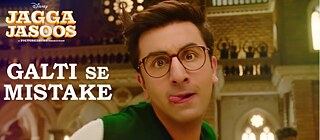Bollywood Bloopers
Hinglish Mistakes and Bollywood’s Peter Pans
The man-child has long been an archetype in Bollywood films – and this character’s clumsy use of Hinglish, the linguistic hybrid of Hindi and English, is one of his defining traits.
In the 1958 Bollywood comedy Dilli Ka Thug (The Trickster of Delhi), the protagonist Kishore (Kishore Kumar) is in love with Asha (Nutan), a young, modern Indian woman. She’s introduced to the audience in a swimsuit and we learn that she’s “Mumbai ki mashoor tairaak Asha” (the famous swimmer Asha from Mumbai). Soon, we see her reading English books, dressed like any of her British or American contemporaries. Kishore, on the other hand, resembles a great many comedic Kishore Kumar characters — everymen with slapstick humour and manic energy, topped off with an inability to take things seriously. In other words, he’s a variant of the man-child.
Surrounded by slapstick routine
“C-A-T Cat,” the song with which Kishore woos Asha, became one of the first prominent Hinglish hits. It happens after Asha, fed up with Kishore’s slapstick routine, reads aloud from an English psychology textbook. Kishore tries and fails to follow suit, his English (or rather Hinglish) mistakes prompting laughter from Asha. She hands him an alphabet primer, suggesting that he brush up on his basics first — cue the song. Predictably, he’s no more proficient in English by the end, but she has moved closer to what we know will be another conquest for the Bollywood man-child, English-led modernity bested by Hinglish-led incorrigibility.
Weaponization of Hinglish bloopers
This intrepid weaponization of Hinglish bloopers is further escalated by the song “Twinkle Twinkle,” from the 1970 film Purab Aur Paschim (East and West). In a musical face-off, the London-born Preeti (who smokes, drinks, wears minidresses, and has blonde hair for good measure) sings “Twinkle, Twinkle, Little Star.” In response, the patriotic man-child Bharat (Manoj Kumar) sings the same words with a Punjabi accent, so that “star” sounds more like “sitar.” He follows it up with Hindi lyrics that promise to “fix” her wayward Western lifestyle; Hinglish one, English nada (again).
Formal and sophisticated
These Hinglish mistakes and the battles they helped win were premised on the fact that up until the late 1990s, English in Bollywood movies represented formality, sophistication, and social capital. By the turn of the century, however, with the exponential growth of the TV and advertising industries, young, urban Indians spoke English routinely (and therefore in Hindi-speaking regions, Hinglish). In 1999, Captain Vikram Batra of the Indian army memorably used the Pepsi slogan, “Yeh dil maange more!” (“The heart wants more!”) as a victory signal for his company. By the late 2000s, Hinglish became ubiquitous among Bollywood stars, politicians, and even TV anchors from English-language news channels.
Unrealistically buff
In the 2012 film Student of the Year, unrealistically buff high schoolers Rohan (Varun Dhawan) and Abhimanyu (Sidharth Malhotra) proclaim pious love for their classmate Shanaya via the song “Ishq Waala Love” (“The Ishq-Love”) redundant usage since ishq already means “love.” Through this Hinglish mistake, they both insist that their love is superior, a poem written by Faiz Ahmad Faiz, aglitter with the sonorousness of Hindi/Urdu: “‘Surkh’ waala, ‘soz waala, Faiz waala love” (“my love’s the stuff of surkh, soz, and Faiz”). The tables thus turn linguistically, but the man-child continues to exploit Hinglish.
Linguistic parlour trick
The 2018 song “Galti Se Mistake,” from the Ranbir Kapoor/Katrina Kaif-starring Jagga Jaasoos (Detective Jagga), marks the epitome of this linguistic parlour trick. Galti already means “mistake,” and so the phrase ends up conveying another Hinglish redundancy, a mistake committed mistakenly, if you will. Kapoor, of course, is Bollywood’s pre-eminent contemporary man-child, having played several variants on the theme since the late 2000s, in films like Bachna Ae Haseeno (Beware, Ladies), Wake Up Sid, Rockstar, and others. And yet, none of these films push the man-child trope quite as hard as Jagga Jaasoos does.
An elaborate Tintin homage by the director Anurag Basu’s own admission, the titular Jagga is a wunderkind detective, a 17-year-old schoolboy (sporting a Tintin-like cowlick) portrayed by the then 34-year-old Kapoor. “Galti Se Mistake” is an upbeat coming-of-age song, rambunctiously choreographed at a boy’s hostel with Jagga leading the festivities. In Hinglish, he urges them to embrace manly activities; “body banaa na” (bodybuilding), “stubble ki fasal ugaa na” (letting your stubble-crop grow out), and so on.
Never grow up
The song then moves on to its main course, its prescriptive mode vis-à-vis women with lines like “seat pe piche ladki bithaa ke dekh,” which means “try having a girl sit behind you (on a bike).” Significantly, Jagga experiences precisely this moment later in the film when Shruti (Katrina Kaif) unwittingly falls asleep while riding pillion on his bike, clinging to Jagga. He smiles in pleasure at the ersatz intimacy (the “childlike” mischief) — before he wakes her up gently (the “gentlemanly” gesture) with his back and she hastily re-distances herself.
The suspension of disbelief necessary for Kapoor’s casting to work is aided by these Hinglish boys-to-men references. “Galti Se Mistake” thus feeds a defiantly cheerful, “boys will be boys” tautology, as if to confirm that the Bollywood’s Peter Pans will indeed never grow up. The 34-year-old Kapoor becomes “one of the lads” with a Hinglish sleight of hand. Everybody dancing alongside him knows that while a simple mistake (like enjoying not-quite-consensual physical contact with a woman) might call for censure, a galti-se-mistake is just boys being boys.


